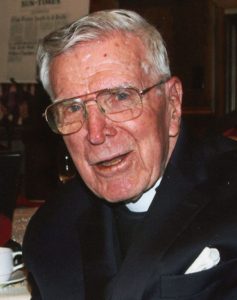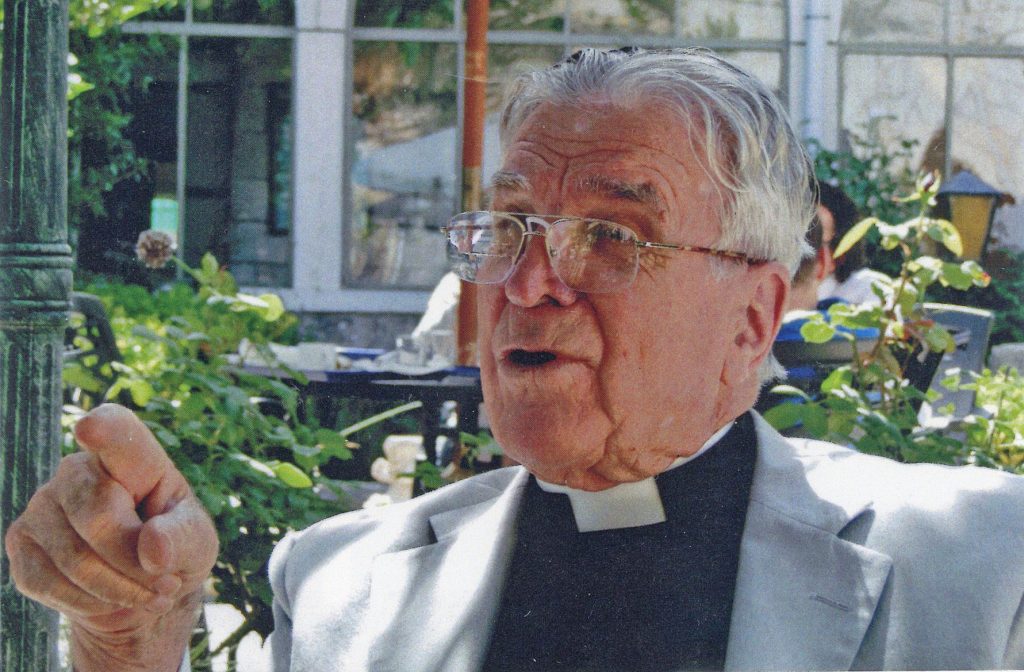Chaplain William Broughton
Veteran of Three Wars; Peacemaker
William Broughton, known to his many friends as Father Bill, died September 22 after a brief illness. He was 93.
During his long and storied career (nearly 50 years in the US Navy), he experienced service in WWII, Korea and Vietnam, and became an invaluable member of the Chaplain Corps. He was dedicated in retirement to bringing about peace and reconciling adversaries in the Holy Land.
Father Bill went through life on a mission to share God’s word, and this task was made easier by his marvelous demeanor and polite determination, welcoming personality and chiseled good looks.
Bill’s family came from the Lake District of England, during the Great Depression. They moved to New Bedford, Massachusetts, a seaport where many European immigrants came seeking (and finding) a better life.
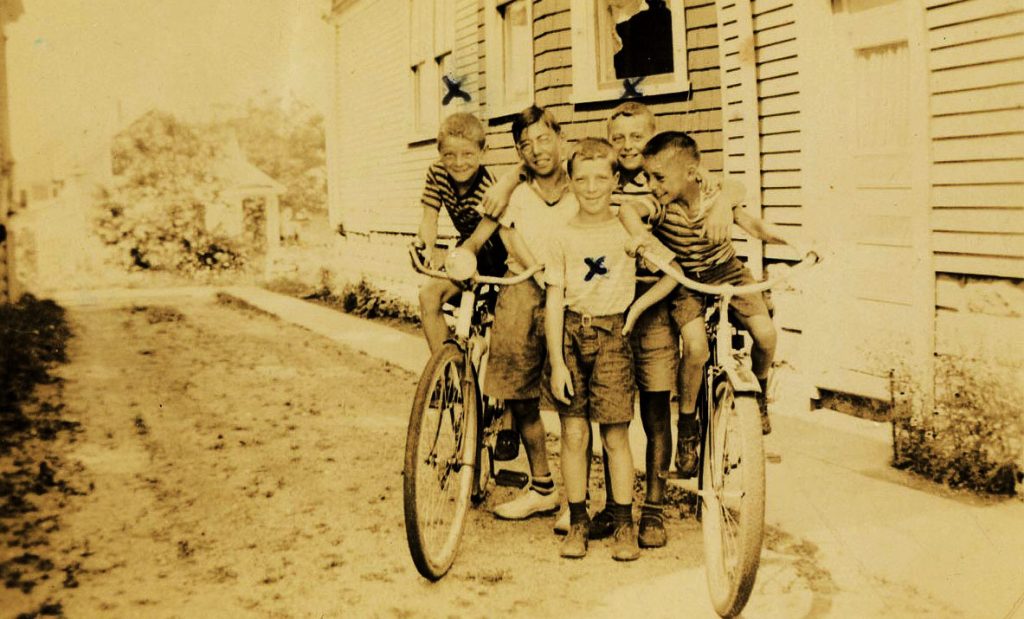
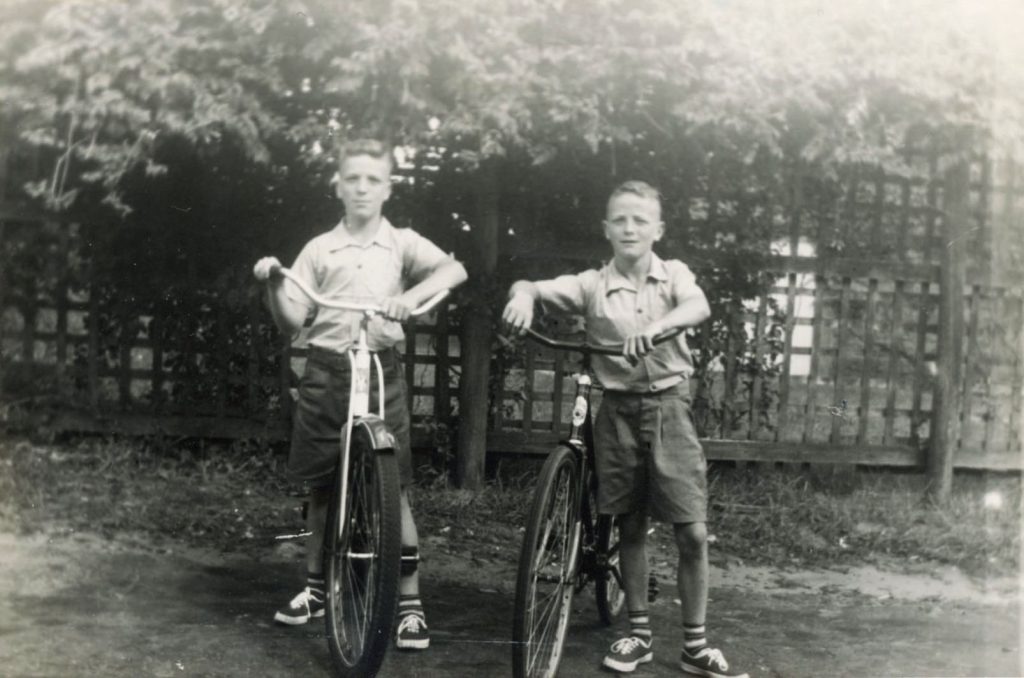
Bill was born Aug. 29, 1929 as one of four brothers. As a very young man he decided he wanted to go into the Navy. He recalled as a child playing dockside, on the decks of the old whaling ship, the Charles W. Morgan, and dreaming of a life at sea. Little did he know how seasick he would become aboard ship his first two years in the service of his country.
His earliest influences were his parents. “I believe very strongly that we all live spiritually by what others give us in life,” he said.
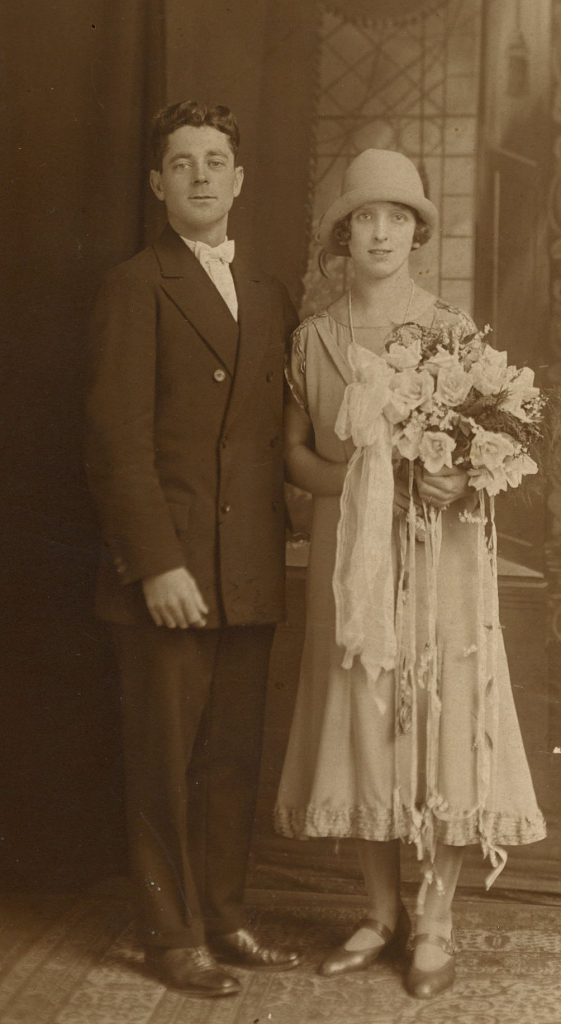
“My own mother, who died when I was seven, always had soup in the house. My father was a baker, so there was always bread. It was at the height of the Great Depression, and between them, no one went hungry in our neighborhood in those tough times. They were a constant outpouring of love and care, and many were touched by this. I was no exception.” Bill referred to this as the beginning of his call to the priesthood.
His father was a Unitarian and his mother Roman Catholic. Bill was what he called, “The great compromise.” He was raised Episcopalian.
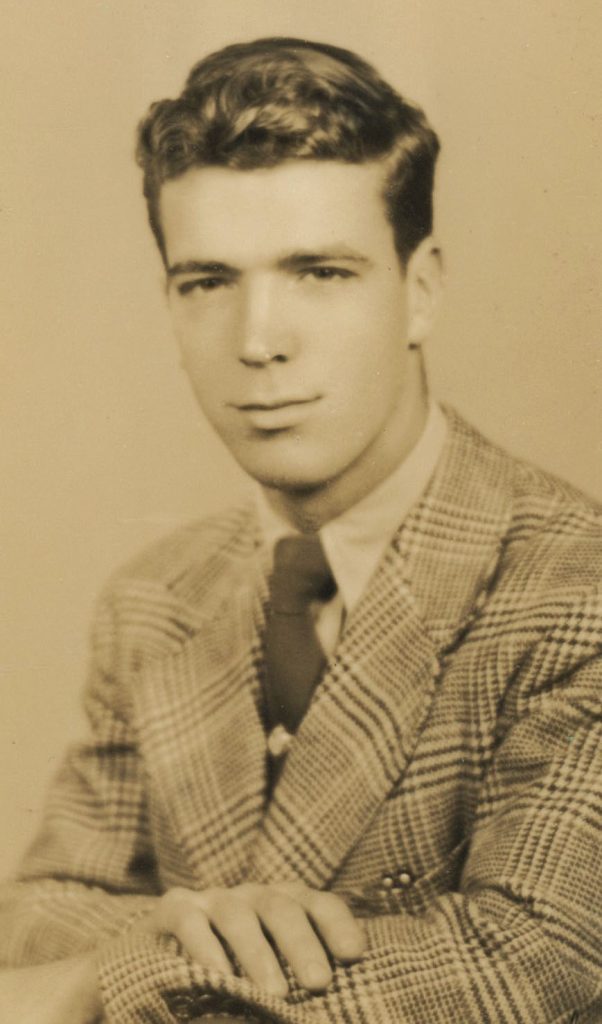
At the age of 17, Bill’s dreams of joining the U.S. Navy became reality. After finishing high school, he enlisted, and served four years on destroyers. It was during this time he decided to go into the ministry. He went to college and then entered seminary. He was ordained and served at a parish in Winnetka, Illinois for the next decade.
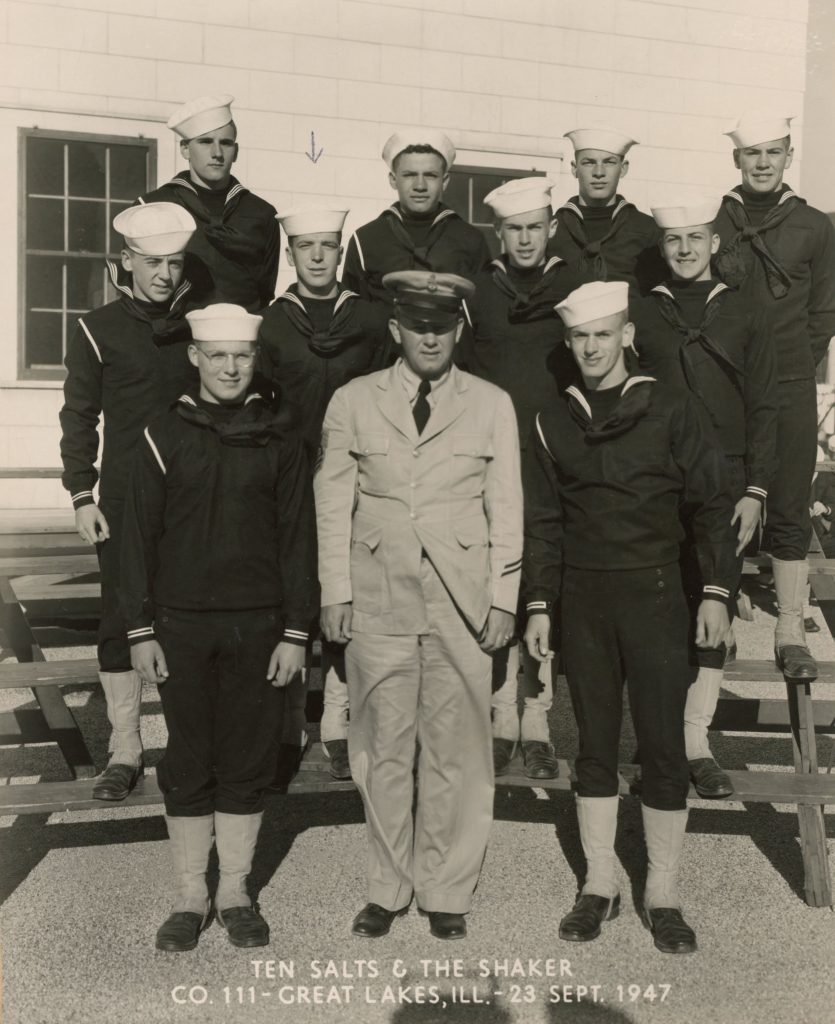
Father Bill’s long military career would continue to reinforce his feelings about serving and helping people. In 1947 he was with the 7th Fleet when they deployed to China on the destroyer, USS Hammer. Tsingtao was headquarters of the Western Pacific Fleet of our Navy. US Marines provided security for the naval facility there. It was at the end of WWII, and Bill saw something there that changed his life forever.
“I realized that we must serve the people of the world, not exploit them”
“As we sat at anchor,” Bill said, “Chinese junks sailed up to our ship eager to sell odds and ends and colorful trinkets to our young sailors. They came in good will, but got too close to our ship. The captain yelled out, ‘Turn the hoses on those people!’
“I thought, how inhumane to turn a hose on human beings who were just welcoming us to their port. It left an indelible mark on my soul. It suddenly began to churn in my mind that we do not have the right in life to impose this kind of authority upon others. I realized that we must serve the people of the world, not exploit them.”
Bill’s dedication to helping adversaries find common ground became legendary during his long life and career as a priest and communicator.
On another mission in Tsingtao, with Marines on the ground, he witnessed the implementation of horrific interrogation and physical torture by the Communists that was both frightening and dehumanizing.
Being a military chaplain in the field of battle tested Father Bill’s mettle time and time again, as he went from one war zone to another – Communist China, Korea, Vietnam.
In 1950, while still on destroyer duty, his ship, the USS Gurke (along with five other destroyers) had to fight their way through mined waterways, 30-foot tides and five-knot currents. All this amidst continuous fire from the Inchon shoreline. History records it as “The Sitting Duck Incident” (the Inchon Harbor Invasion).
Father Bill overheard his commanding officer say that their mission was to draw enemy fire so US planes could target their gun installations on shore. But what he remembered most was his comment, “Washington has declared that we are expendable.” This, history tells us, set the stage for General Douglas McArthur’s initial landing at Inchon.
“After that, I never questioned my calling”
When Father Bill heard that term “expendable” amidst the frightening barrage of enemy fire, he turned to his Bible, and the 23rd Psalm (“Yea though I walk through the valley of the shadow of death …”). His ship took three major hits during that battle, but their mission was successful.
“It was an amazing thing,” he would recall many years later. “I suddenly sensed more than ever before that this was it. My life was to be a life of total commitment to the service of God and my fellow man. After that, I never questioned my calling.”
On the subject of the TV show, “M*A*S*H,” Father Bill took great delight in watching how the screenwriters balanced humor amidst the madness and human frailty of war. It was especially meaningful to him, as the show’s Father Mulcahy, a fictional character, paralleled Bill’s own real-life mission, in the midst of the Korean War.
“Father Mulcahy? He was marvelous as the chaplain,” Bill would chuckle. He likened his own career to that of the TV chaplain, in that he felt he could never do enough; always inferring he had more to do. And yet, the TV chaplain was at ease — at ease with himself and with God — despite the casualties and chaos of war taking place around him. “I could certainly relate to that,” he said.
In 1959 Bill was ordained to the Priesthood in the Diocese of Chicago. In 1968, Chaplain Broughton entered the Navy Chaplain’s School at Newport, Rhode Island as a Lieutenant (junior grade). He retired in 1985 as a full Commander.
“You can’t appreciate the Bible without getting your hands dirty”
During his long career Bill discovered a love for biblical archeology. He participated in several digs throughout the Middle East. In 1964 he served with the Archbishop in Jerusalem for three months while helping to recover valuable artifacts and the discovery of the ancient site of Tel Gezer. He was fond of saying, “You can’t appreciate the Bible without getting your hands dirty.”
Father Bill received an archeology scholarship to work for two years (1965-66) in Jerusalem. His first dig uncovered a gate dating from the period of King Solomon. He was hooked on biblical archeology for life.
It was at this time he began working with Bishop Quebain, the former Arab Bishop of Jerusalem, and what Bill described as “a tri-lateral conversation.” This involved meeting with Jews, Christians and Moslems, all in the same room, to resolve common needs and public situations that affected them all. These were conversations designed to protect the spiritual welfare of Jerusalem. It was a first in inter-relations and religions, and was not always an easy or welcomed effort by some.
His intimate conversations and meetings with people of such different backgrounds changed Bill’s way of thinking forever. He began working very closely, through the church, in the field of Jews, Christians and Moslem thinking and endeavors. This organization would become the Ecumenical Theological Research Fraternity in Israel. Broughton would eventually serve as Fraternity president.
He wrote a dissertation on that subject that now serves members of the Chaplain Corps and helps introduce others to life and beliefs in that part of the world that most certainly had an impact on how individuals lived, worked and served as Americans in the Middle East, in the Holy Land, then, and now, moving forward.
“Leave this place immediately!”
Father Bill’s life was by no means casual and uneventful. Once, in Israel, he stopped his car to take some pictures. Suddenly, tanks began to move into the village. Bill was arrested and his camera seized. He was thrown into a jail with numerous revolutionaries and young Arabs who began to hail him as a leader. Why? He did not know, but he worried his captors would think he was their ringleader.
The other prisoners didn’t speak English but kept toasting and hailing him. He was afraid to contact the American Embassy for fear it would become a headline-driven scandal. Finally, after several hours, a young Israeli officer spotted him and extracted him from the prison. His camera was returned, but not the film. He was told, “Leave this place immediately!” He did.
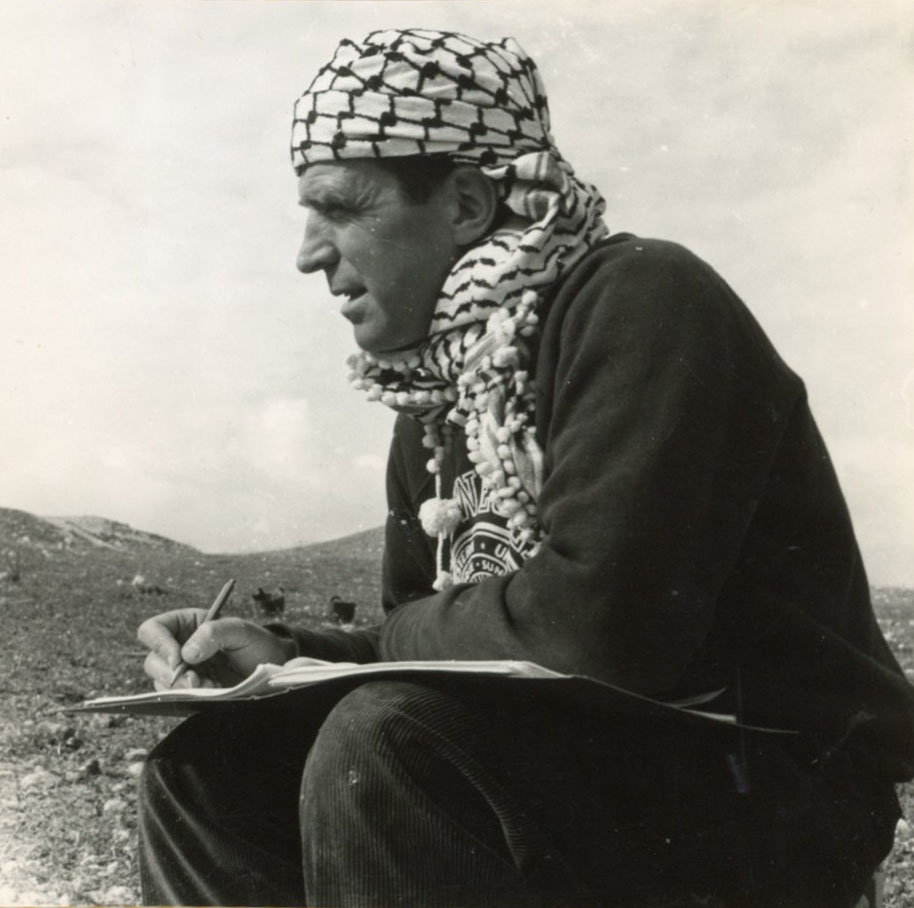
Another time, Bill and a handful of other biblical archeologists were on a dig in the Middle East. Suddenly a group of men rode into his desert camp on horseback, shrieking in high-pitched voices, their tunics and head-cloths blowing in the wind, like a scene out of “Lawrence of Arabia.”
They pulled out their swords and ordered Bill and the others to get on their knees. They put their swords to the throats of the shocked Americans, then laughed and rode away. Just another mysterious and memorable story from Father Bill’s long life.
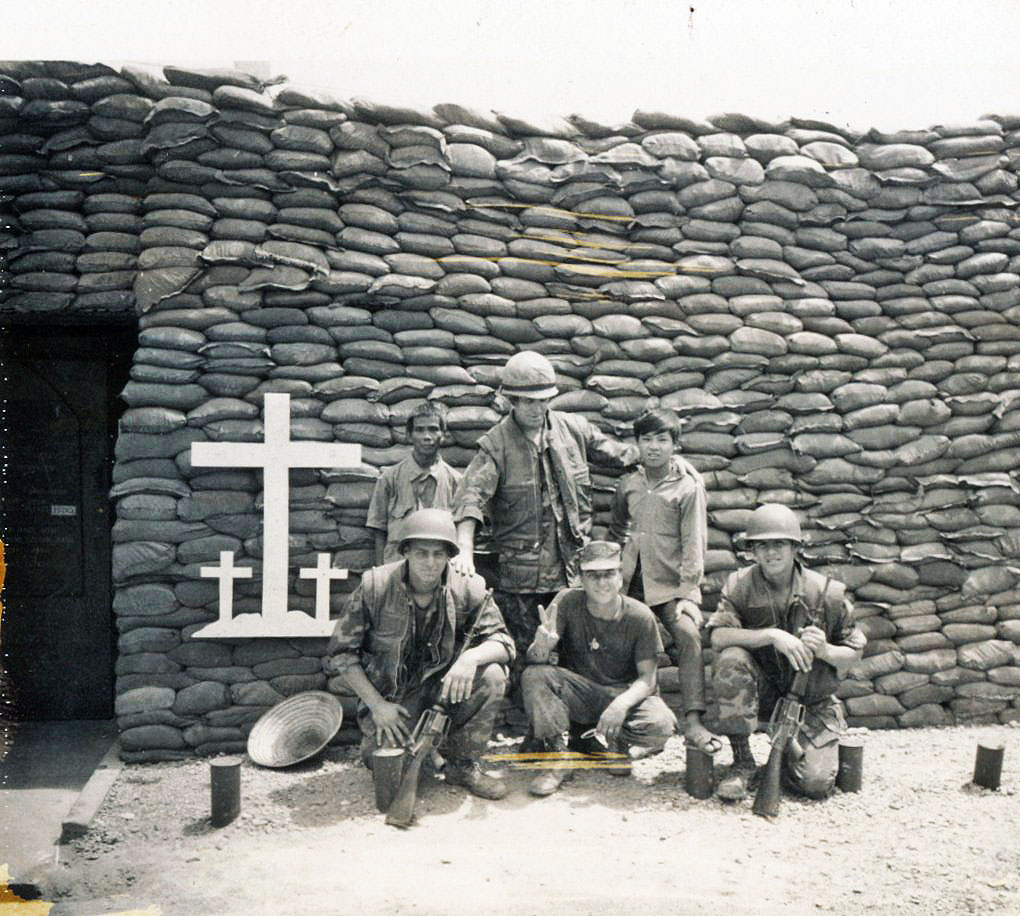
The scenes of war stayed with him his whole life. He described how he made many friends in Vietnam, while serving as battlefield chaplain for the 1st and 3rd Marine Divisions, in the war zone. Young men he had met in the jungles clung to him as their only connection to home and family. They loved him dearly, and he them.
Bill recalled years later his interaction with those young men fighting in Vietnam. “I think they were impressed more than anything with the human element of the chaplain,” Bill said. “They felt I represented their family, their home, their loved ones. That I was somebody who cared, and was not part of the system. I was a person who would listen to their pain and their tragedy of being thrown into that inhumane situation, which was complicated even more by the rejection of their own countrymen back home.
“On top of that, they knew that every step they took might be their last. Would a boobytrap go off? Or some other form of jungle trap, to mar or disfigure them? They wanted out, and we few chaplains were the only way they could find escape. We listened to their fears, the anxiety that ran extremely deep. So deep, in fact, they were scarred for the rest of their lives, carrying severe physical and mental injuries with them back to society.”
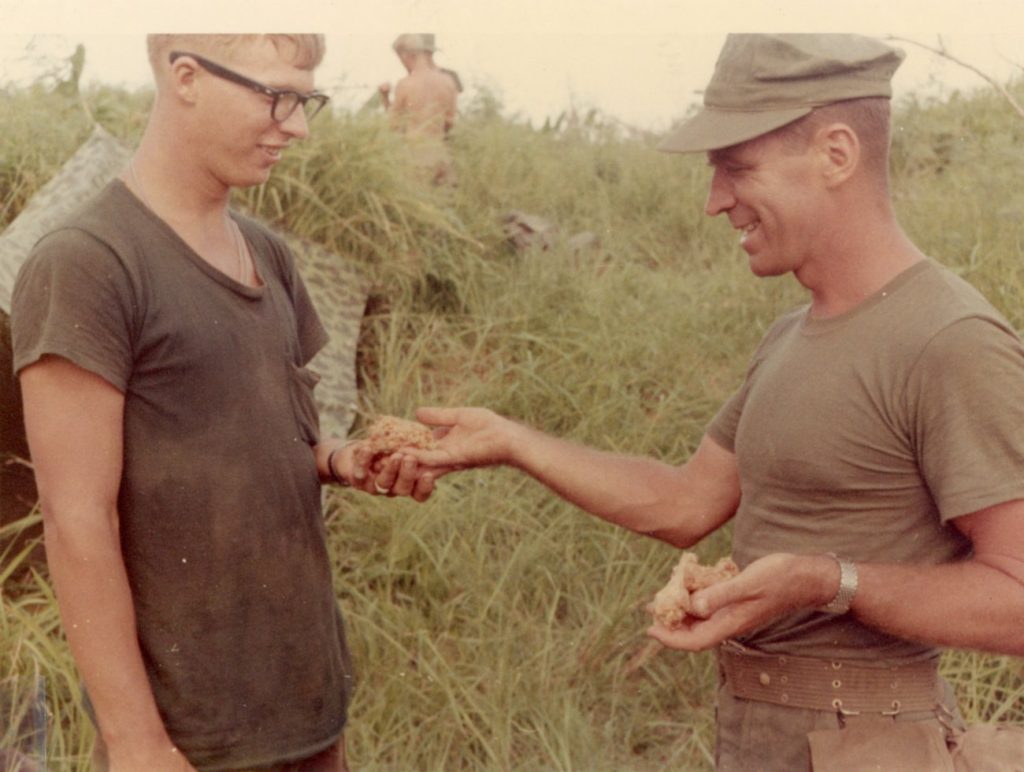
Father Bill had to perform far too many last rites over these young men, both American and Vietnamese. He watched as one of his closest young friends, a man all the soldiers called “Strawberry,” was carried in on a stretcher with his legs blown off. He didn’t last long, but Father Bill held him close in his final minutes, praying together all the while. That day, Strawberry died in Father Bill’s arms.
Father Bill received the Navy Commendation Medal in 1972 for meritorious service while serving as Battalion Chaplain in connection with combat operations against the enemy in the Republic of Vietnam and at the Marine Corps Base in Okinawa (1969-1970).
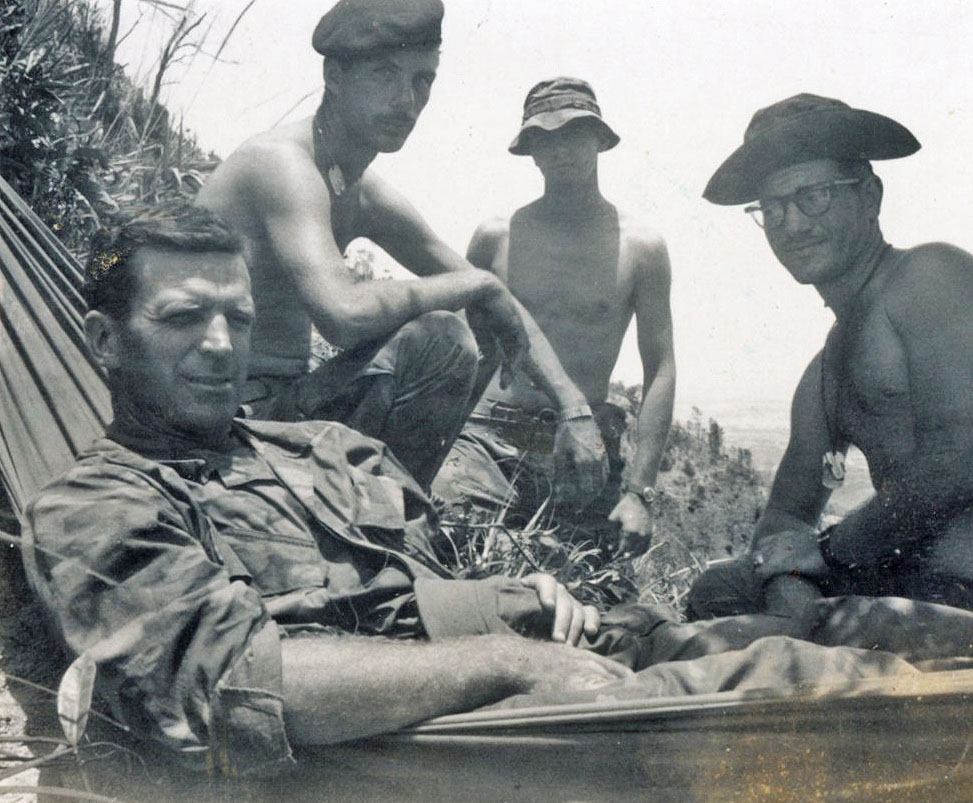
In his initial assignment he participated in numerous combat operations and repeatedly disregarded his own safety as he moved from one forward sector to another to conduct religious services, provide spiritual guidance, and encourage and comfort young men in the front lines. Many a time he would convert Quonset huts or stacked sandbags into impromptu chapels, while persistently initiating programs to bring spiritual relief to our soldiers and sailors between enemy attacks.
In 1975, Father Bill participated in the Mayaguez Incident to retake an American merchant vessel, her captain and crew of 39, and return them to safety. History books refer to the Mayaguez Incident as the final combat action of the Vietnam War.
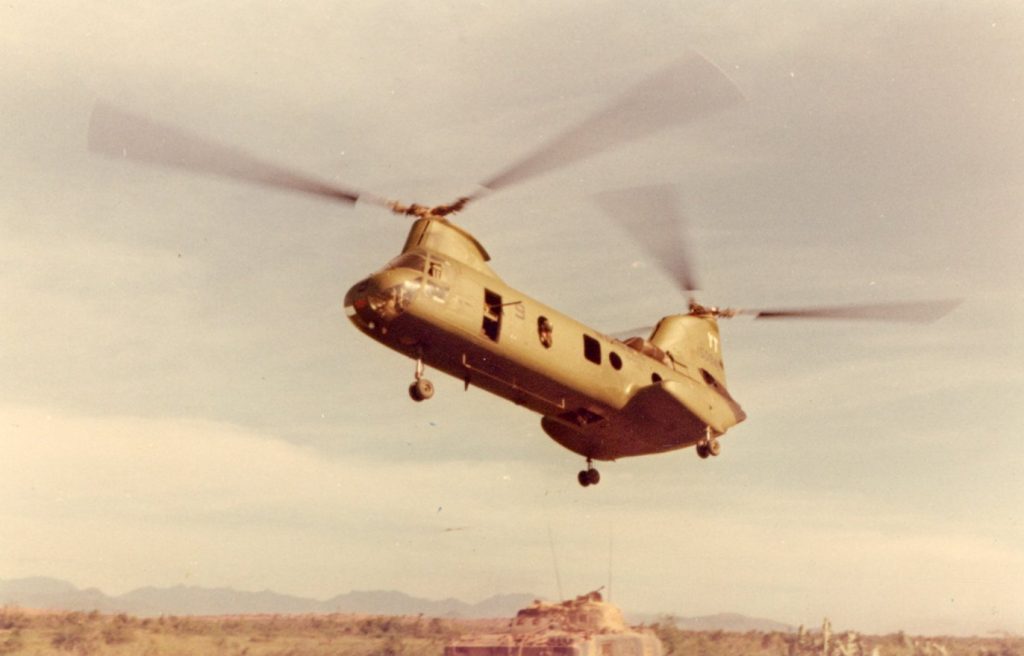
A humble man, Father Bill was nonetheless proud of the many honors and distinctions presented him, such as the Navy Commendation Medal with Bronze V (two awards), Coast Guard Commendation Medal and Combat Action Ribbon, Navy Unit Commendation and Meritorious Unit Commendation, Good Conduct Medal, Navy Expeditionary Medal, Navy Occupation Service Medal, China Service Medal, National Defense Medal (two awards) and the Korean Service Medal (two awards). Each one carried volumes of memories, both of pain and joy.
He also received two Vietnam Service Medals with FMP Combat Operations Insignia. He received the Humanitarian Service Medal and the United Nations Service Medal. He received the Korean Presidential Unit Citation as well as the Republic of Vietnam Gallantry Cross.
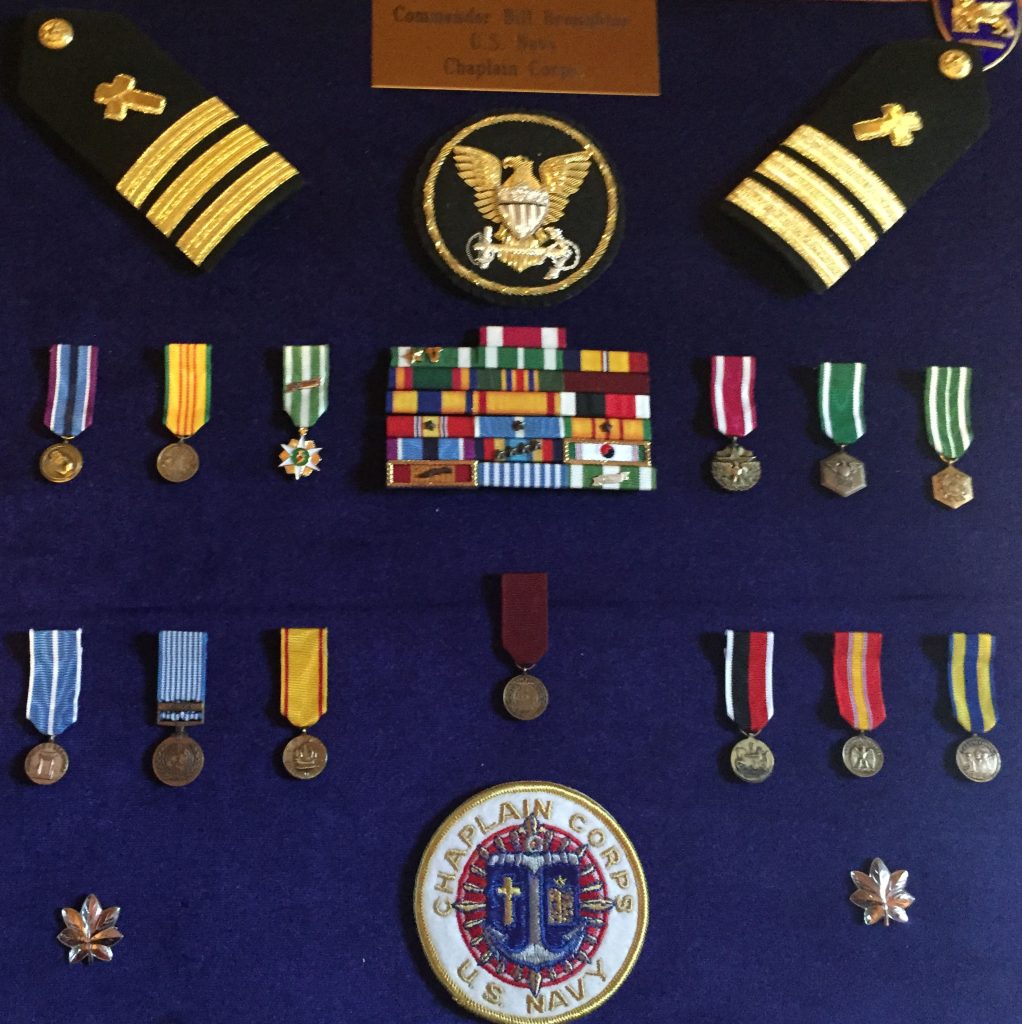
Father William Broughton’s military career included serving on the destroyer USS Hammer (1948-1950), the destroyer USS Gurke (1950-1951), First and Third Marine Divisions, Vietnam (1969-1970), Navy Shipyard at Hunters Point, San Francisco (1970-1974), the destroyer USS Denver (1974-1976), Naval Training Center, San Diego (1976-1978), US Coast Guard Center, Governors Island, NY (1978-1981), Commander Sixth Fleet (1982-1984), and the Naval Amphibious Base, Coronado, CA (1984-1985), among others.
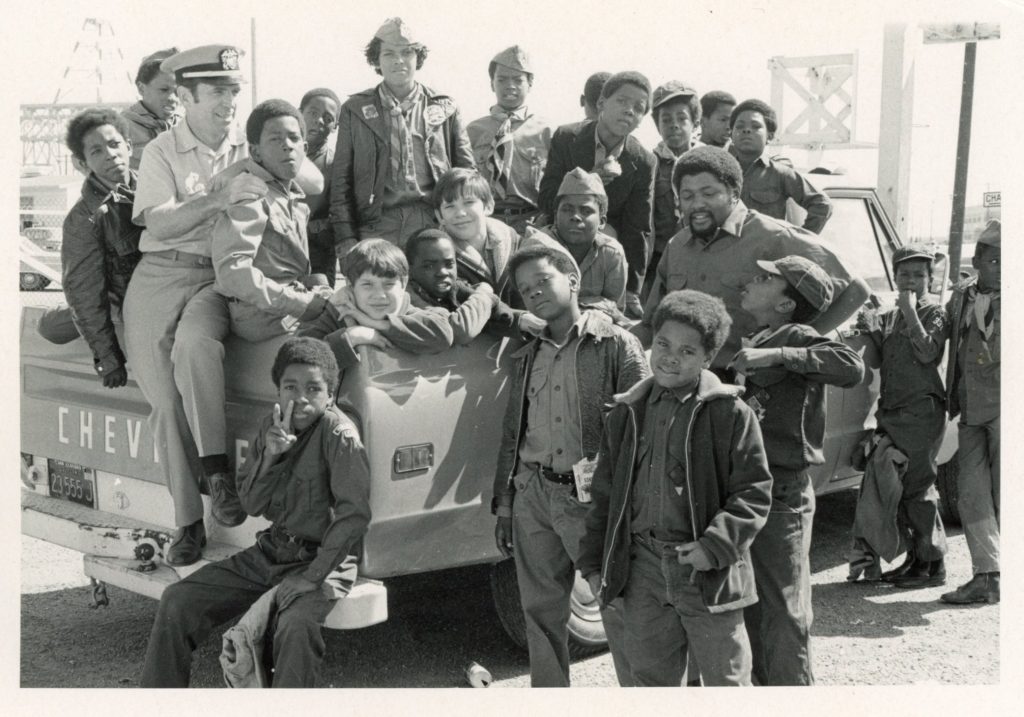
When all was said and done, Commander William Broughton had come a long way from the decks of the old whaling ship, Charles W. Morgan, and childhood dreams of being a sailor. He was honored again and again throughout his long career. His civilian ministries were many. Commander Broughton’s final military duty was to serve as the Protestant Chaplain at the US Naval Amphibious Base, Coronado before his retirement in 1985.
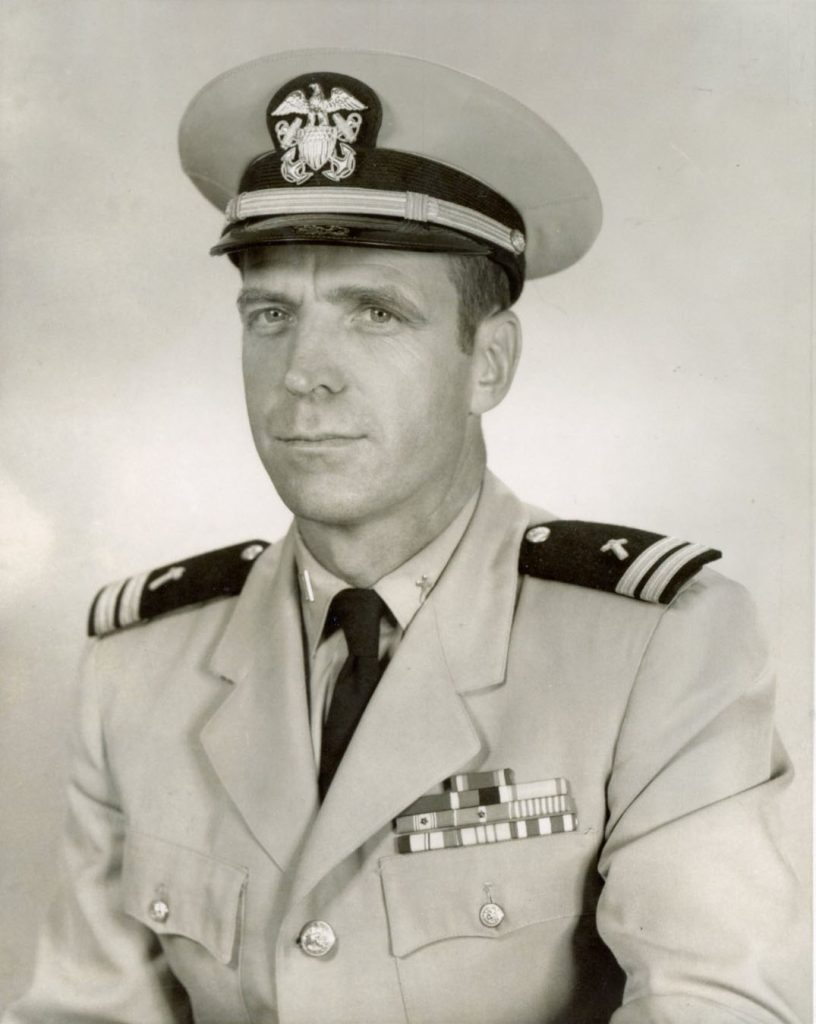
After his retirement from the Navy, Father Bill became chaplain to the Episcopal Bishop (Samir Kafity) in Jerusalem. He continued in that position until the mid-1990s. According to his longtime friend, Yazeed Said, “The bourgeois citadels of the Episcopal diocese of Jerusalem did not prove to be always sedate or cooperative enough. A period of tensions between [Bill] and the ecclesiastical authorities in Jerusalem developed due to his openness to be friends with both Palestinians and Israelis.
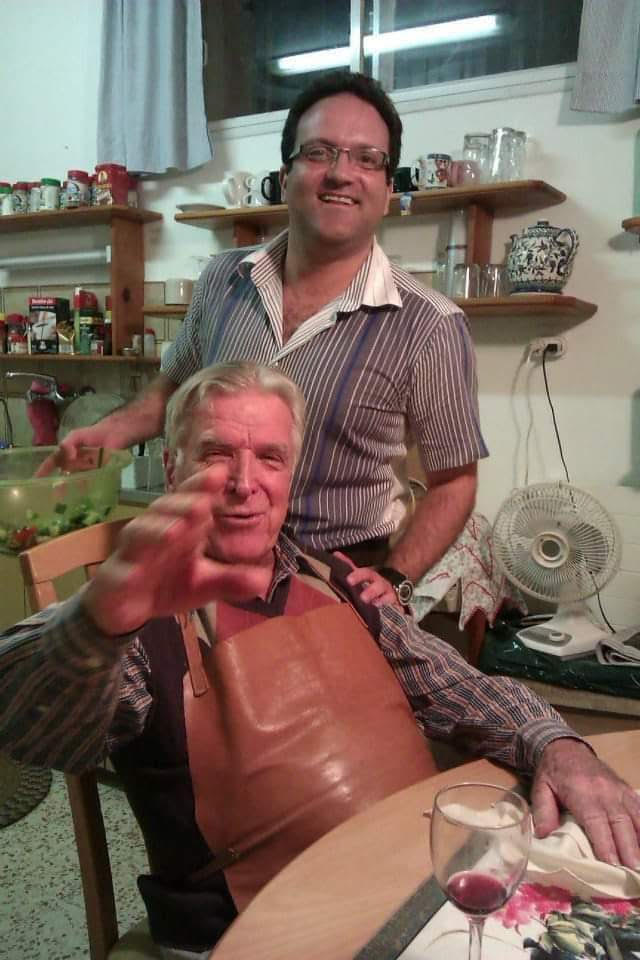
“He resigned his position and continued to live in Jerusalem until he decided it was time to return to San Diego and ‘prepare for a good death back home.’ During his years of retired life in Jerusalem, Bill continued to be a community builder. He brought people from all walks of life together to share a meal at his house. He gave courses in various Christian institutions and continued to share in the archaeological research and on-site digs of various internationally renowned scholars in the field.”
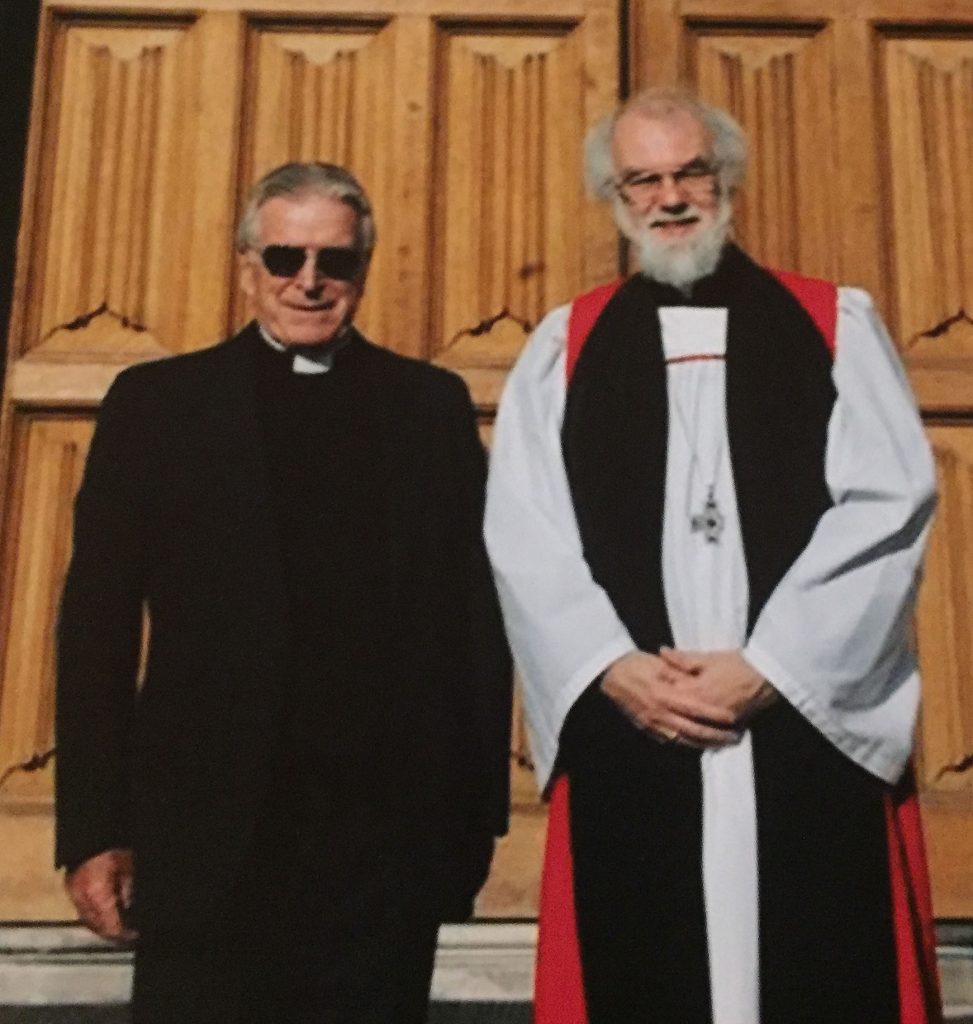
In 2008 Father Bill was invited to London by the Archbishop of Canterbury to receive the Cross of St Augustine. This meant a great deal to Father Bill. The Cross is presented to only a small number of people, who have given long and exceptionally distinguished service to the Church of England, or have contributed conspicuously in advancing friendly relations with various Christian communities and churches.
“I don’t believe he ever really knew retirement”
The Reverend Steve Mather, Pastor Emeritus of Coronado Community Church, was a huge fan of Father Bill, and had an interesting take on his life. “Father Bill was curious,” said Rev. Mather. “Nothing was foreign to him. He saw life as a stage and was determined to see as much, and investigate as much, as was humanly possible. One has to really love the Bible to do all of that. Father Bill wanted to get behind the scenes. It takes work to accomplish so much in one lifetime. I don’t believe he ever really knew retirement. We will all miss him.”
In the early 1970s Father Bill purchased a condo at the Coronado Shores. It became his safe haven, his place to re-energize, to relax. Up until the very end he could be seen doing his daily sunset walk, pushing his walker, finally stopping at the southern corner of the upper parking area.
He would turn and sit on the walker, and enjoy an unencumbered view of God’s colorful salute to the day gone by, to the days gone by. It was what he loved most in his life as the end closed in around him. God knows, Father Bill had a lot to reflect upon.
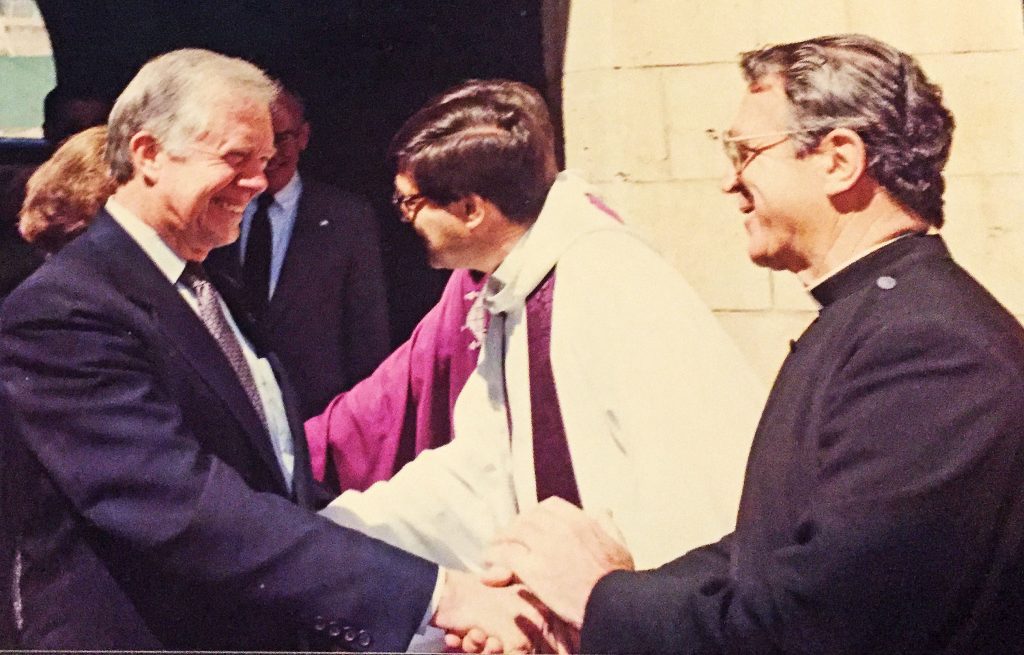
“If I could do one last thing,” said a humble Cmdr. William Broughton at his retirement from the Navy, “I would like to salute each person that I have ministered to in the name of the Lord, and thank each one for so great an honor.”
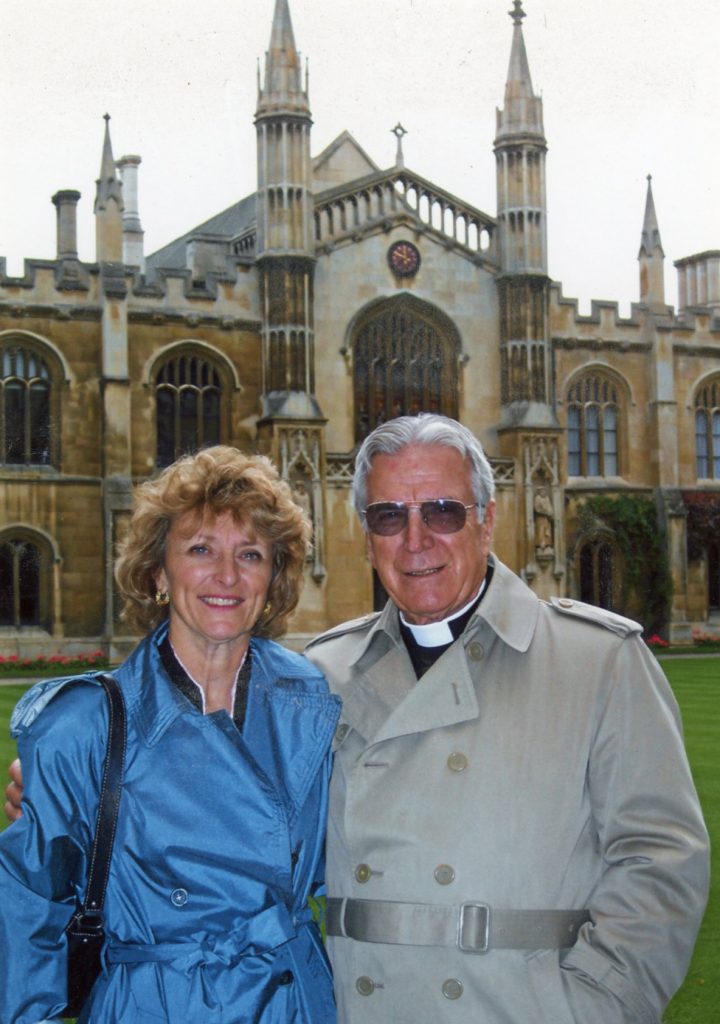
Father Bill never married, never had children. And yet, he was surrounded by family and friends his entire life. Surviving family include nieces and nephews David, Kyle, and Nicholas Broughton, Melody Pacheco, Melaine and Danielle Medeiros, Kerrie and Emma Broughton, Paul and Kathleen Magliolo.
Father Bill is also survived by his close friend and frequent companion, Tami Dorr, who took care of him until the very end.
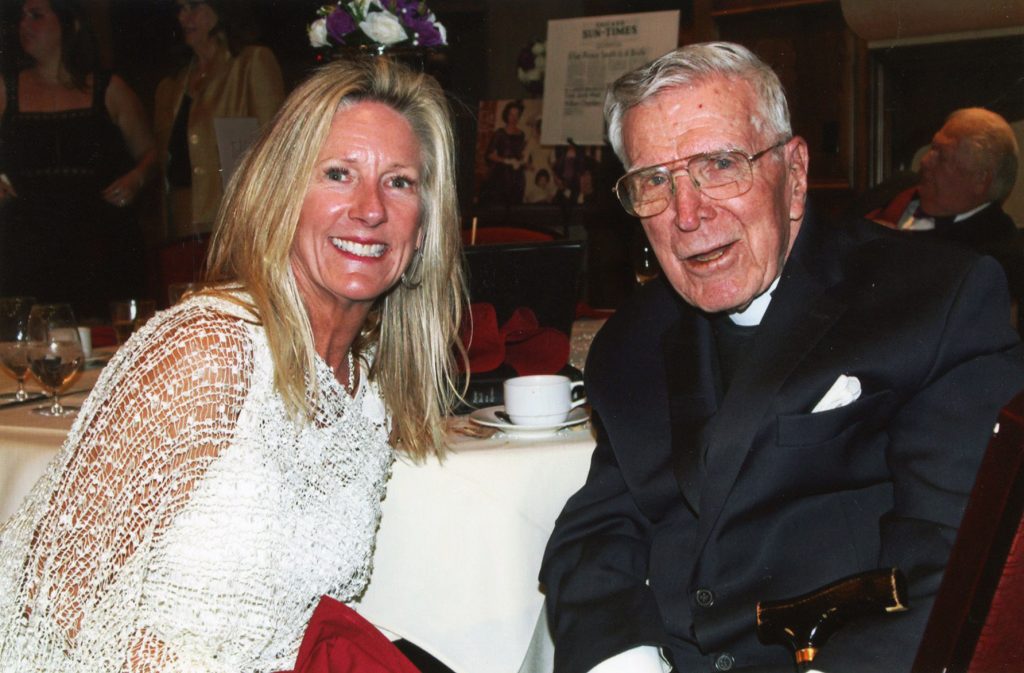
Services for William Broughton will take place on Friday, Oct. 7, at 10 am, at Saint Paul’s Cathedral, 2728 Sixth Avenue, San Diego, CA 92103. The Rt. Rev. Dr. Susan Brown-Snook will preside. Services will be available to watch on the internet by visiting www.stpaulcathedral.org.
In lieu of flowers, donations in his memory may be made to a charity of your choice to, “Take care of people,” as Father Bill would say.




